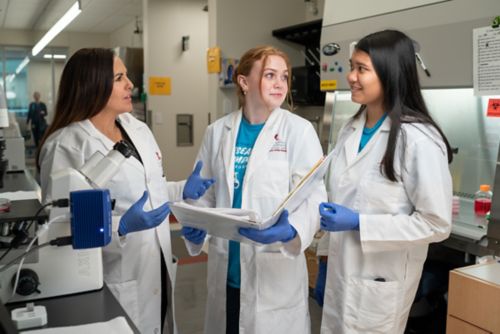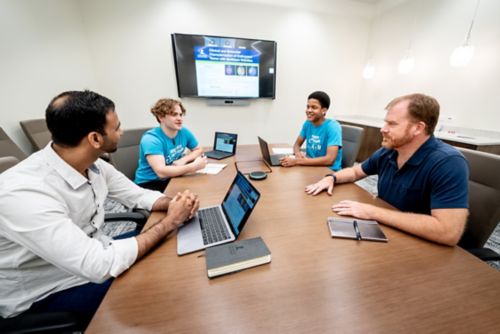St. Jude Family of Websites
Explore our cutting edge research, world-class patient care, career opportunities and more.
St. Jude Children's Research Hospital Home

- Fundraising
St. Jude Family of Websites
Explore our cutting edge research, world-class patient care, career opportunities and more.
St. Jude Children's Research Hospital Home

- Fundraising
High School & College Program
Program Manager: Gwen Alexander, PhD
Research Immersion Program
St. Jude launched a unique research immersion program for Memphis area high school students. An initiative outlined in the St. Jude FY22–27 Strategic Plan, the internship program provides structured educational and hands-on experience for students interested in biomedical science. It also helps to enrich and increase the diversity of the scientific workforce by providing opportunities for highly talented students who reflect Shelby County demographics.

Program Purpose
A lack of diversity in the biomedical workforce is a fundamental problem that affects the rate and direction of scientific progress. It also has a negative impact on access to care in the U.S. and around the globe.
To address this challenge, St. Jude launched an eight-week summer high school research immersion program to provide structured educational and authentic research experiences for students interested in biomedical science.
Equitable Selection Process
The program was intentional to incorporate best-practices for ensuring an equitable selection process. To reduce reviewer bias, the selection process involved multiple rounds of blinded and unblinded review from a diverse group.
Peer and Mentorship Relationships
Positive relationships and a sense of belonging are integral in fostering the development of scientific identity and ensuring retention of future scientists in the biomedical career pathway—especially for students from marginalized backgrounds. In designing the program, the St. Jude STEMM Education and Outreach Program staff carefully considered the programmatic structures put in place and how these structures might work to foster relationships within the program—both peer-peer relationships and mentor-mentee relationships.
To promote strong, positive peer-peer relationships, students entered research spaces in pairs rather than individually, which is often the case in research immersion programs. It can be very intimidating for students to walk into a research space all alone, fearing that everyone there is much smarter than them, or that they’re going to make a mistake or break a very expensive piece of equipment.

These fears can manifest themselves into feelings of imposter syndrome where students convince themselves that they don’t belong. Having students work in pairs offsets these fears by providing a sense of companionship and reassurance that they aren’t the only novice in the room.
To promote strong, positive mentorship relationships, mentors and mentees conducted an activity to co-create their shared expectations and norms for the mentorship relationship. Together, they mapped out how they like to give and receive feedback, what their goals were for the mentorship relationship, their thoughts on how to foster a healthy mentorship relationship, and what their individual roles were in the relationship. These structures helped ensure that all participants (mentors and mentees) felt valued and heard, which is an often overlooked factor in promoting equity.
Emerging Leaders in Biomedical Research Program
The Emerging Leaders in Biomedical Research Program develops leaders in biomedical research by providing them with mentored research experiences at St. Jude coupled with intentional leadership training, which include topics such as laboratory management and effective mentorship. Participating students have the opportunity to practice these skills alongside their mentor during the High School Research Immersion Program. Upper-level undergraduate students majoring in a STEMM field from Memphis-area colleges and universities, including Christian Brothers University, LeMoyne-Owen College, Rhodes College, and The University of Memphis are eligible to apply.
Virtual Science Journal Clubs

The St. Jude Virtual Science Journal Club connects high school students with professional scientists. The program consists of three sessions during the Spring semester in which a professional scientist from St. Jude or another local research institution “visits” the classroom via a virtual platform to discuss findings from a scientific journal. This program is suitable for advanced-level biology and chemistry classes.
The Virtual Journal Clubs are funded through the Science Education Partnership Award (SEPA) through the National Institute of General Medicine (NIGMS).
Cancer Control and Disparities Fellowship
The Cancer Control and Disparities Fellowship engages high school students in a mentored, summer research experience that connects to project-based learning activities at their local school. This program is a partnership among St. Jude, the University of Tennessee Health Science Center, the University of Memphis, and Memphis-area high schools.